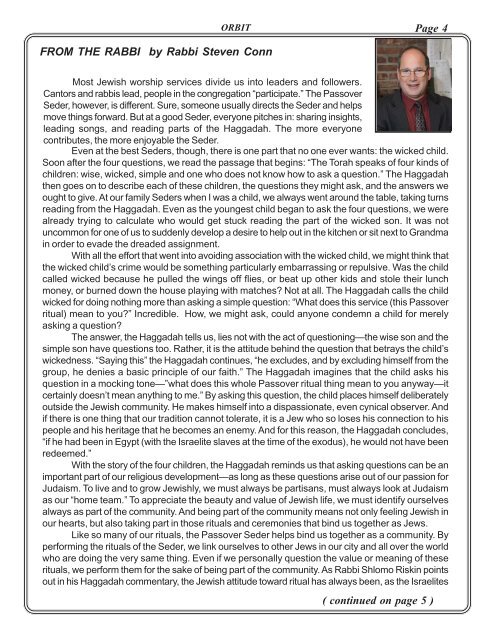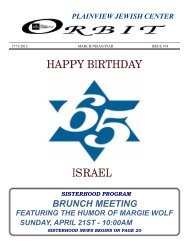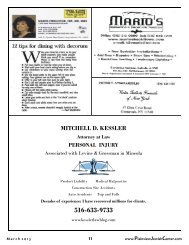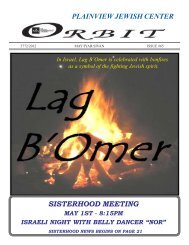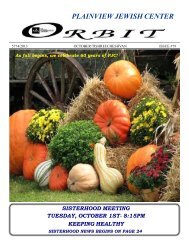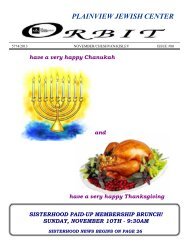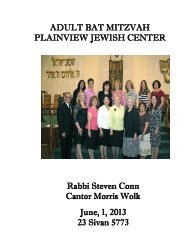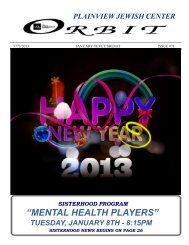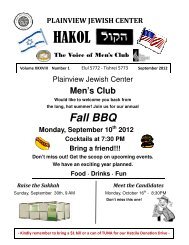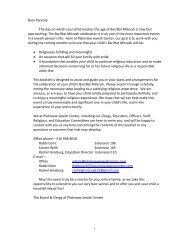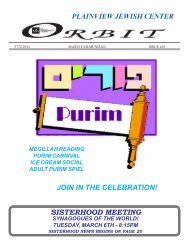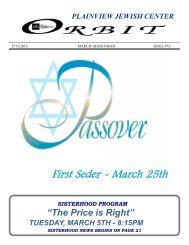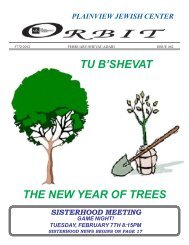Orbit April 2012 - Plainview Jewish Center
Orbit April 2012 - Plainview Jewish Center
Orbit April 2012 - Plainview Jewish Center
Create successful ePaper yourself
Turn your PDF publications into a flip-book with our unique Google optimized e-Paper software.
ORBIT<br />
Page 4<br />
FROM THE RABBI by Rabbi Steven Conn<br />
Most <strong>Jewish</strong> worship services divide us into leaders and followers.<br />
Cantors and rabbis lead, people in the congregation “participate.” The Passover<br />
Seder, however, is different. Sure, someone usually directs the Seder and helps<br />
move things forward. But at a good Seder, everyone pitches in: sharing insights,<br />
leading songs, and reading parts of the Haggadah. The more everyone<br />
contributes, the more enjoyable the Seder.<br />
Even at the best Seders, though, there is one part that no one ever wants: the wicked child.<br />
Soon after the four questions, we read the passage that begins: “The Torah speaks of four kinds of<br />
children: wise, wicked, simple and one who does not know how to ask a question.” The Haggadah<br />
then goes on to describe each of these children, the questions they might ask, and the answers we<br />
ought to give. At our family Seders when I was a child, we always went around the table, taking turns<br />
reading from the Haggadah. Even as the youngest child began to ask the four questions, we were<br />
already trying to calculate who would get stuck reading the part of the wicked son. It was not<br />
uncommon for one of us to suddenly develop a desire to help out in the kitchen or sit next to Grandma<br />
in order to evade the dreaded assignment.<br />
With all the effort that went into avoiding association with the wicked child, we might think that<br />
the wicked child’s crime would be something particularly embarrassing or repulsive. Was the child<br />
called wicked because he pulled the wings off flies, or beat up other kids and stole their lunch<br />
money, or burned down the house playing with matches? Not at all. The Haggadah calls the child<br />
wicked for doing nothing more than asking a simple question: “What does this service (this Passover<br />
ritual) mean to you?” Incredible. How, we might ask, could anyone condemn a child for merely<br />
asking a question?<br />
The answer, the Haggadah tells us, lies not with the act of questioning—the wise son and the<br />
simple son have questions too. Rather, it is the attitude behind the question that betrays the child’s<br />
wickedness. “Saying this” the Haggadah continues, “he excludes, and by excluding himself from the<br />
group, he denies a basic principle of our faith.” The Haggadah imagines that the child asks his<br />
question in a mocking tone—”what does this whole Passover ritual thing mean to you anyway—it<br />
certainly doesn’t mean anything to me.” By asking this question, the child places himself deliberately<br />
outside the <strong>Jewish</strong> community. He makes himself into a dispassionate, even cynical observer. And<br />
if there is one thing that our tradition cannot tolerate, it is a Jew who so loses his connection to his<br />
people and his heritage that he becomes an enemy. And for this reason, the Haggadah concludes,<br />
“if he had been in Egypt (with the Israelite slaves at the time of the exodus), he would not have been<br />
redeemed.”<br />
With the story of the four children, the Haggadah reminds us that asking questions can be an<br />
important part of our religious development—as long as these questions arise out of our passion for<br />
Judaism. To live and to grow <strong>Jewish</strong>ly, we must always be partisans, must always look at Judaism<br />
as our “home team.” To appreciate the beauty and value of <strong>Jewish</strong> life, we must identify ourselves<br />
always as part of the community. And being part of the community means not only feeling <strong>Jewish</strong> in<br />
our hearts, but also taking part in those rituals and ceremonies that bind us together as Jews.<br />
Like so many of our rituals, the Passover Seder helps bind us together as a community. By<br />
performing the rituals of the Seder, we link ourselves to other Jews in our city and all over the world<br />
who are doing the very same thing. Even if we personally question the value or meaning of these<br />
rituals, we perform them for the sake of being part of the community. As Rabbi Shlomo Riskin points<br />
out in his Haggadah commentary, the <strong>Jewish</strong> attitude toward ritual has always been, as the Israelites<br />
( continued on page 5 )


